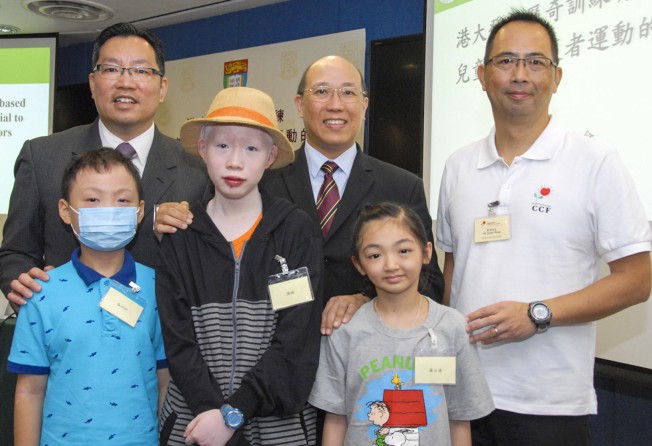
How physical activity aids recovery of Hong Kong child cancer survivors
An adventure-based physical training and health education programme is helping put cancer survivors back on track

A few years ago, just walking up a few flights of stairs was enough to tire out Ryan Chan Ho. Diagnosed with acute lymphoblastic leukaemia at six years old, four months of chemotherapy had put him in remission, but the cancer returned when he was eight.
Ryan then received a bone marrow transplant. "It made me feel very tired and I didn't want to engage in outdoor activities at all," he says.
These days, the 14-year-old boy enjoys cycling and swimming at the weekends. His about-turn on physical activity was sparked after attending an integrated adventure-based training and health education programme organised by the University of Hong Kong.

Engaging in activities such as wall climbing and a mini-Olympics helped build his confidence and made him aware of the importance of regular exercise for his well-being.
In fact, the other childhood cancer survivors who had gone through the same programme as Ryan reported "significantly higher" levels of physical activity, in a follow-up analysis by the HKU researchers nine months after the intervention.
The children also reported greater confidence in their capability to engage in physical activity - which is important for maintaining a regular exercise habit.
On the other hand, physical activity levels and self-efficacy of physical exercises did not see any significant change in a control group of childhood cancer survivors who instead joined leisure activities such as handicraft workshops and visiting a museum.
"By using physical activity as a tool, adventure-based training allows participants to challenge themselves by experiencing, learning and implementing different tasks which seem to be impossible for them to complete," says Dr William Li Ho-cheung, associate professor at HKU's school of nursing and the study's corresponding author.
"It proves that the training can enhance participants' self-efficacy. Most importantly, through challenging games, children learn to never give up as well as build their confidence in doing regular exercise, which is beneficial to their recovery."

The 71 childhood cancer survivors who participated in the study were split randomly into two groups. All went through four activity days over six months: 34 children joined adventure-based physical training camps while the rest attended leisure activities held by community centres.
The children were recruited from Sunshine Parents Club, a non-profit organisation that provides support to parents of Hong Kong Chinese childhood cancer survivors. Aged between nine and 16 years old, the children had not engaged in regular physical activity in the six months prior to the study.
Exercise is a type of therapy that benefits multiple systems in the body
Li says research by the School of Nursing shows about 90 per cent of Hong Kong Chinese childhood cancer survivors did not meet the physical activity levels recommend by the World Health Organisation - at least 60 minutes of daily aerobic activity at moderate- to vigorous-intensity, with vigorous-intensity activity on at least three days per week.
Physical activity participation significantly decreases in children's cancer survivors after diagnosis, Li says. Further, the frequency of both moderate and vigorous physical activity decreases substantially after treatment completion, and falls even lower after remission.
Regular exercise is beneficial to patients' physical and psychological health, says Li. Moderate exercise can help reduce the adverse effects of cancer treatments, such as fatigue and reduced muscle strength and endurance.
However, many child survivors report that fatigue and reduced physical strength and endurance after remission prevent them from engaging in regular physical activity. In addition, they are often advised by their parents to rest more.
Rest could do more harm by accelerating fatigue because physical inactivity induces muscle catabolism and atrophy, which in turn may lead to a further decrease in functional capacity.
"With the recent advances in medical technology, the overall cure rate of childhood cancers is more than 70 per cent. But the late effects of cancers or anti-cancer treatments are also starting to emerge," says Professor Godfrey Chan Chi-fung, head of HKU's department of paediatrics and adolescent medicine.
"How to minimise and manage these newly arising issues is one of our major concerns and future research direction."

An increasing body of research shows the benefits of exercise for cancer patients and survivors. Last month, a study by Kansas State University showed that regular brisk walking or slow jogging enhances tumour oxygenation, which may improve treatments in cancer patients.
"If we can increase the efficacy of radiation treatment, then the patient's prognosis is enhanced," says lead author Brad Behnke, an associate professor of exercise physiology.
"An intervention like exercise has almost universally positive side effects versus other treatments that can have deleterious side effects. Exercise is a type of therapy that benefits multiple systems in the body, and may permanently alter the environment within the tumour."
Research also has shown that moderate exercise can help cancer patients counteract some of the side effects of treatment - such as low blood count, fatigue, cachexia and lost muscle mass, Behnke says.
Another study by Dutch researchers published in the Journal of Clinical Oncology in April found that women with breast cancer who follow a physical exercise programme during their chemotherapy treatment experienced fewer side effects such as fatigue, reduced physical fitness, nausea and pain.